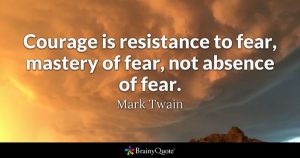Survival Tactics

“The 100,” an interesting science fiction, dystopian Earth story gives a fascinating look at human survival tactics. One particular  season, a group of survivors had to live in an underground bunker, due to atmospheric conditions. The food supply was limited and extreme measures had to be taken for the survival of the human race. The leadership mantra came down to, “You are either Wonkru (the group name) or you are the enemy of Wonkru.” This mantra came with a flashing sword and blood spilled for those who “chose” to be enemies. Meaning, they disagreed with how the food was to be rationed. I love apocalyptic stories and scenarios, in fiction. Not so much in real life.
season, a group of survivors had to live in an underground bunker, due to atmospheric conditions. The food supply was limited and extreme measures had to be taken for the survival of the human race. The leadership mantra came down to, “You are either Wonkru (the group name) or you are the enemy of Wonkru.” This mantra came with a flashing sword and blood spilled for those who “chose” to be enemies. Meaning, they disagreed with how the food was to be rationed. I love apocalyptic stories and scenarios, in fiction. Not so much in real life.
I have heard of the psychological term, “survival-mode,” used for people who experienced a lack in their early years. Lack, meaning neglect or abuse. This turned on the primal instincts they needed to survive their circumstances. There are some adults who made their way in the world against all odds, and are a testament to the human spirit. I know some of these people and admire them so much! They took control of their lives and created a new way to live. They work hard, and love and live with mercy in their hearts towards their fellow man.
The sad part is when someone had no choice to live in survival-mode, but can never pull themselves out of it as they age. There is an emotional stranglehold on their lives. Some sort of default position of, “You are with me or you are my enemy.” People who are stuck in survival-mode can see the slightest disagreement as a personal affront. Genuinely feeling,”physically or emotionally unsafe,” can be triggered by normal human differentiation. Psychology today describes it as a disconnection between the body and the brain. “All disconnection between the brain and body, we could say, is some version of this same dynamic: it happens when the body, because of various cues or triggers, is thrown into an unnecessary state of survival mode that does not correspond to any actual or significant risk to survival or well-being. In modern life, this kind of disconnection is remarkably, shockingly, and tragically common.”
I wonder if “survival- mode,” as I’ve described it, is functionally living from a position of fear. Fear of lack. A subconscious emotional state that rules normal relational interaction. An interior foundation which states, “I’m not going to get what I need.” I love the counselor’s advice to take all fears to their logical conclusion. Really ask the question, “What if…”. I’ve made my kids do this, at times when they could verbalize a fear, really run it down and see what they are afraid of at the core. Then work to navigate the real fear, and dismiss unnecessary ones.
Yes, I’m familiar with counseling. One of my fears reared its lovely little head when I was sharing some wisdom with my first born son. Before I was done, he chimed in verbatim. He echoed exactly what I was saying! We laughed, but it was eye-opening. “Uh, guess I’ve told you that before.” “Yes Mom, you have, repeatedly.” Talk about a teaching moment, for me not him. I thought about it long and hard and tried to become aware of how much I repeat myself. I had to ask myself what was that all about and damn that must be annoying for my family. I’m still figuring out why I do that. Some fear of not being heard continues to be a struggle for me.
Now, Moms and wives get a bad rep for being “nags.” From repeating ourselves over and over. I endeavored to learn something from that as well. I have a huge yard that my first husband used to mow regularly and when our boys were old enough, they helped. I made an assumption that they would keep helping once their Dad wasn’t in residence. The first year we had a jungle . I would ask and hear an, “Ok,” but it never seemed to get done. I finally asked one son, “Why do you say ok when you really have no plan to help mow the grass?” We talked and I discovered that it was his most hated chore and he would rather do anything else to help out. Another successful teaching moment. We negotiated and found a way to help each other out. I realized I didn’t mind cutting the grass but hated some other chores that he was perfectly fine in covering for me.
We all develop habits from making our way in the world, and communication and connection not only with others but with our interior voices is so important. It would be nice to not have to learn sword fighting just to have a conversation.




Discussion